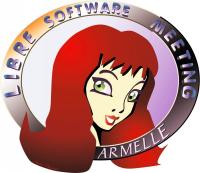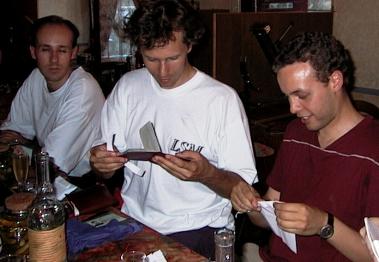 Free software developers believe in their work
Free software developers believe in their work
This article was originally published in Finnish in MikroPC magazine, issue 12/2001, 23.8.2001.
 Free software developers believe in their work
Free software developers believe in their work
The GPL license is one way to ensure that the companies play by the rules of the community.
The restaurants of Bordeaux were filled with social nerds when the second annual Libre Software Meeting started in France in the beginning of July.
The event gathered over 300 participants from 34 different countries and offered them a high quality technical conference program along with comfortable surroundings for discussions.
The team spirit was inspired by the French word "libre" (free as in freedom), which in the case of software means the right to use, modify and distribute the program freely. The best known are the GNU/Linux operating system and a growing number of applications that work on top of it.

|
| By exchanging and signing pgp encryption keys one can create his own network of trust. I.D. cards were passed around even in dinner tables. |
African representatives seeked advice from the top security people on how to build their network and Jan Buchal told everybody about the special needs of visually impaired.
Free software requires new methods to control the product. More and more companies wonder what kind of stand they should take on the phenomenon. Good software can be downloaded for free off the net and it can even be modified according to their needs.
Clearly there are big opportunities but the traditional laws of software market don't apply. The developer community welcomes companies but on their own conditions.
Christoph Lameter's product is the TelemetryBox, a tool to survey the operation of a network. It is built on the Debian GNU/Linux operating system mostly by cleverly combining existing programs.
Christoph has seen the wild rise and quick fall of the Silicon Valley technology companies and how the collapse made venture capital harder to get. Also the future of TelemetryBox was at stake.
"The biggest mistake of the venture capitalists and management was to think about open source or free software products as regular proprietary programs that could be sold using established methods in the software industry from the past", says Lameter. A free program cannot be controlled in the traditional way by owning the source code, because everybody can get it from the network and make a new version.
Employing the key developers gives a possibility to guide the development in the desired direction. However, free software projects can only be controlled within certain limits and it is difficult, Christoph points out.
Money can be made out of services and by offering the combination of consulting and the product as a solution. The problem of this approach is scalability in profits, because good workers cannot be duplicated like a succesful product.
Free software as part of hardware is also a working model that interests both big hardware constructors like IBM and new innovative small companies, for example TiVo which makes a Linux-based digital video recorder.
Selling proprietary add-ons is often possible but arouses mixed feelings in the community.
Microsoft has recently campaigned against the GNU General Public License (GPL). The key point is the clause that demands that a modified version of a GPL licensed program has to be published under the same conditions as well.
The idea is to guarantee that the program stays free, while for instance the BSD license in the Apache www server allows free use of the code also in proprietary programs.
"Careful planning now shows its power", proclaimed the author of the essay Anarchism Triumphant, lawyer Eben Moglen.
According to Eben the GPL license is the greatest achievement of the Free Software Foundation. In addition to Microsoft the music and movie industries are worried about it. Plans to prevent copying using closed data formats don't work with free software.
Last update 22.11.2001.